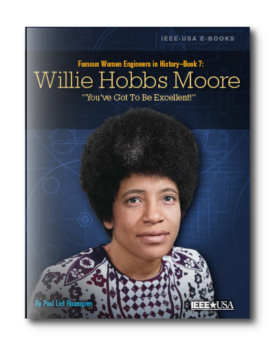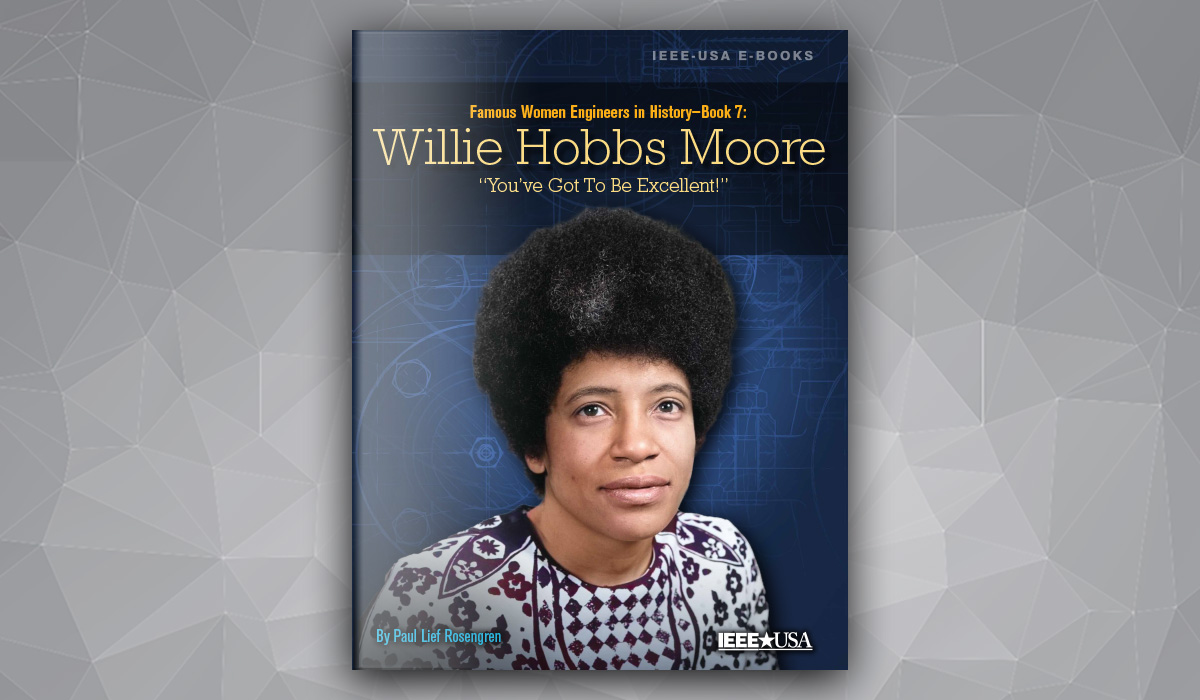
On Willie Hobbs Moore: Academic Barrier Breaker and Ford Engineer
FREE to IEEE Members
Non-Members: $2.99
IEEE-USA has published the 7th in the IEEE-USA Famous Women Engineers in History e-book series, Willie Hobbes Moore: “You’ve Got to be Excellent!”
Willie Hobbs Moore broke barriers in academia as the first Black woman to earn a Ph.D. in a science (physics) in the United States; she went on to work as a researcher at various engineering firms, and finally, at Ford Motor Company.
Willie Hobbs was born in Atlantic City, excelled in high school, and at the age of 18 left Atlantic City on a train to the University of Michigan. She was the first member of her family to attend college.
Moore was the first Black woman to receive a BS in Engineering from the University of Michigan in 1958. In 1961, she became the first Black woman to receive her MS in electrical engineering from there, as well.
The University of Michigan had admitted its first Black male student in 1853, Samuel Codes Watson (the university was unaware of the breaking of the race barrier, for Watson was light skinned and “passed as white.” He later became Detroit’s first elected Black city official.) Twenty-four years later, the university accepted its first Black woman, Mary Henrietta Graham.
Despite this history, Moore did face discrimination, recalling how the chair of another engineering department on campus said to her, “You don’t belong here. Even if you manage to finish, there is no place for you in the professional world you seek.”
She would later give advice to minority engineering students, saying, “There will always be prejudiced people; you’ve got to be prepared to survive in spite of their attitudes.” As she regularly did, she shared her mantra, “You’ve got to be excellent.”
Moore worked as an engineer and researcher for several years, before returning to the University of Michigan as a student. At that time, she studied toward a Ph.D. in physics, under spectroscopist Samuel Krimm, focusing on the theoretical study of secondary chlorides in polyvinyl chloride (PVCs).
Moore would publish more than 30 papers on protein spectroscopy, many co-authored with Krimm, in publications such as the Journal of Applied Physics, Journal of Chemical Physics and Journal of Molecular Spectroscopy.
Krimm remarked that Moore was “an intelligent and creative person who always had a positive attitude and showed it in her approach to problems that arose in research, moving purposefully to solve them.”
Moore had a promising career in academia; but instead, she decided to work in industry for the Ford Motor Company.
In 1977, Moore started at Ford Motor Company as an engineer. Like many Black women in industry, her credentials and impressive resume were not enough. She remarked in an interview with the Ann Arbor News that some of her colleagues at Ford made it clear they believed she was hired to fill a quota as part of Ford’s affirmative action efforts.
Again, she proved herself, and rose to the executive level of the company.
Moore’s biggest accomplishment at Ford was helping to introduce the quality methods of Genichi Taguchi. Taguchi believed design that reduced variation drove down costs and reduced rejected product, product returns and waste. His ideas fueled the continuous improvement movement and revolutionized the Japanese auto industry. Moore applied Taguchi’s principles at Ford. She developed them into working design methods engineers at the company could use.
In 1985, Moore wrote a book with Yuin Wu, Quality Engineering Products and Process Design Optimization. In it, Moore and Wu wrote, “Philosophically, the Taguchi approach is technology rather than theory. It is inductive rather than deductive. It is an engineering tool. The Taguchi approach is concerned with productivity enhancement and cost effectiveness.”
In 1991, Ebony magazine named Moore one of the 100 most promising Black women in corporate America.
Moore often mentored younger students at the University of Michigan and newer employees at Ford. She also tutored Black middle and high school students in Ann Arbor for many years. To each of these groups she again stressed her mantra, “You’ve got to be excellent.”
While Moore was the first Black woman to receive a Ph.D. in physics in 1972, since that time many more have followed her path. As of 2012, 66 Black women had received Ph.D.s in physics in the United States. By 2020, the number was well past 100.
Other books in the award-winning Famous Women in Engineering History Series include:
- Hedy Lamarr: Inventor Extraordinaire and Hollywood Star
- Edith Clarke, Trailblazer in Electrical Engineering
- Lillian Gilbreth, Transforming Work
- Kate Gleason, Leading the Way
- Judith Resnik, Engineer, Astronaut, American Hero
- Esther Conwell — Theorist and Mentor
IEEE-USA Publishing Manager and Editor, IEEE-USA E-Books, Georgia C. Stelluto, initiated, edited and produced the Famous Women Engineers series. Author Paul Lief Rosengren has written the books in this series.
